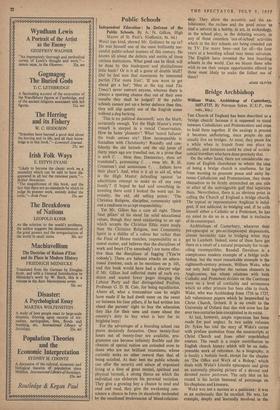Public Schools
Independent Education : In Defence of the
Public Schools. By A. N. Gilkes, High
He was himself one of the most brilliantly suc- cessful public-school masters of this century. He knows all about the defects and merits of these curious institutions. What good can he think will be done by this inadequate and platitudinous little book? Or is it all a game of double bluff?
Did he feel sure that statements by interested parties ('Eat more fruit'; 'If you want to get ahead get a hat'; 'Men at the top read The
Times') never convert anyone, whereas there is always a sporting chance that out of their own
mouths they shall be judged? If the public schools cannot put up a better defence than this, they will slip quietly out of the English scene without a dog barking.
'This is no political documen't,' says the blurb, accurately enough. Yet the High Master's every remark is steeped in a rancid Conservatism. How he hates 'planners'! What 'moral failures' the trade unions are! How incompatible is Socialism with Christianity! Roundly and con- fidently the old hatreds and the old loves of thirty years ago are trundled out, in a prose that is arch ('. . . bless thee, Democracy, thou art translated'), patronising ('. . . even Mr. R. H. Crossman') and sententious ('. . . fathers have their place'). And, what is it all in aid of, what is the High Master defending against 'an adscititious attempt to make us all one cosy family"? (I hoped he had said something in- teresting there until I looked the word up). In- evitably, the old, old selling points : 'The Christian Religion, discipline, community spirit and a readiness to accept responsibility.'
Yet Mr. Gilkes has a case all right. Those 'four pillars' of his stand for solid educational values, though they need readjusting to an age which accepts the Christian Ethic more easily than the Christian Religion, sees Community Spirit in a dislike of a colour bar rather than the Final of House matches, responsibility as a moral matter, and believes that the disciplines of work and heart ('I'm somebody') are more effec- tive than the disciplines of fagging ('You're nobody'). There are hideous attacks on educa- tional freedom, such as he mentions on p. 101, and this book would have had a sharper edge if Mr. Gilkes had collected more of such evi- dence and wasted fewer pages slanging the Labour Party and that distinguished Pauline, Professor G. D. H. Cole, for being equalitarian. Above all, what a tremendous case he might have made if he had dwelt more on the sweet air between his four pillars, if he had written less about the parents' right to buy the education they like for their sons and more about the country's duty to buy what is best for its brightest boys!
For the advantages of a boarding school can prove decisively formative. Once twenty-four hours out of twenty-four are available, pro- grammes can become infinitely flexible and the chances of special tuition are extended even to those who are not brilliant examinees, whose curiosity seeks no other reward than that of being satisfied. At their best the public schools can offer the security and solace of organised living at a time of great mental, spiritual and physical turmoil, a strong theme on which the individual can elaborate his personal variation. They give a growing boy a chance to read and read and read, they give the awakening con- science a chance to form its standards unclouded by the emotional irrelevancies of blood-relation-
ship. They allow the eccentric and the ex- hibitionist, the recluse and the good mixer to find a solvent in a hobby, in art, in archeology, in the school play, in the debating society, in any of those countless 'out-of-school' activities which in the day schools are being crowded out by TV. For many boys—not for all—the four years at a boarding school may mean salvation. The English have invented the best boarding schools in the world. Can we blame those who wish to see their unique opportunities offered to those most likely to make the fullest use of them?
ADAM OLIVER














































 Previous page
Previous page